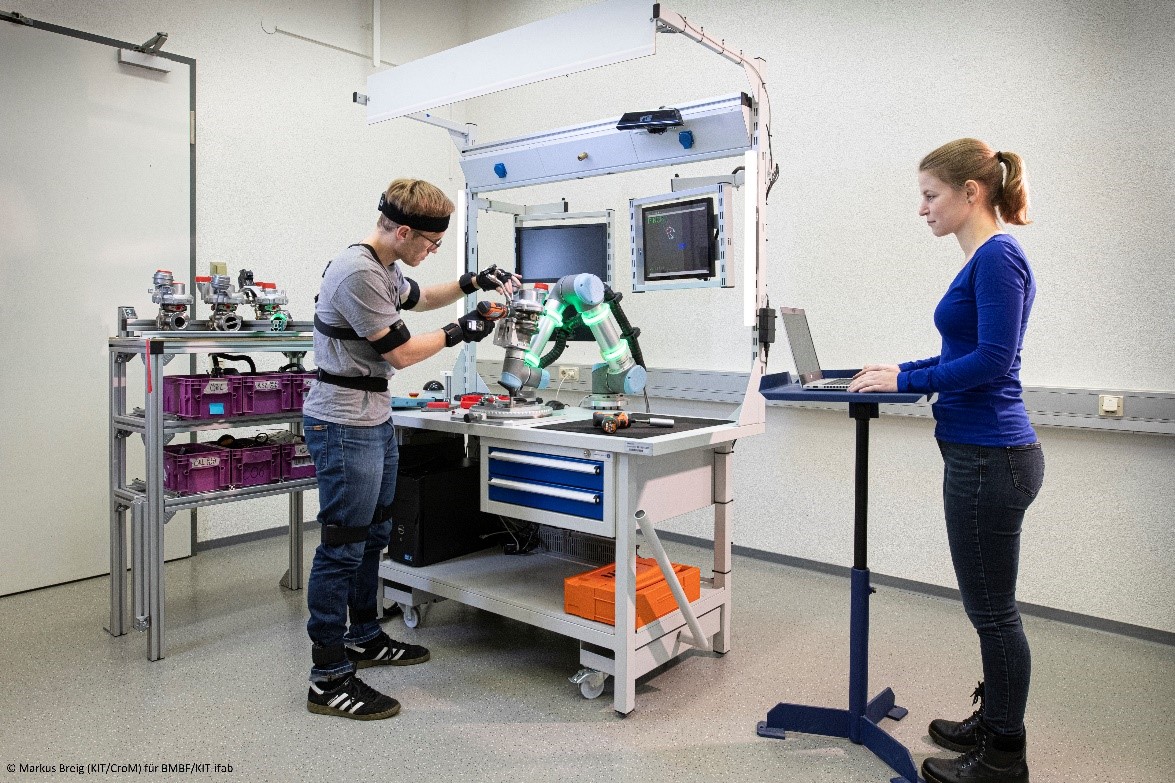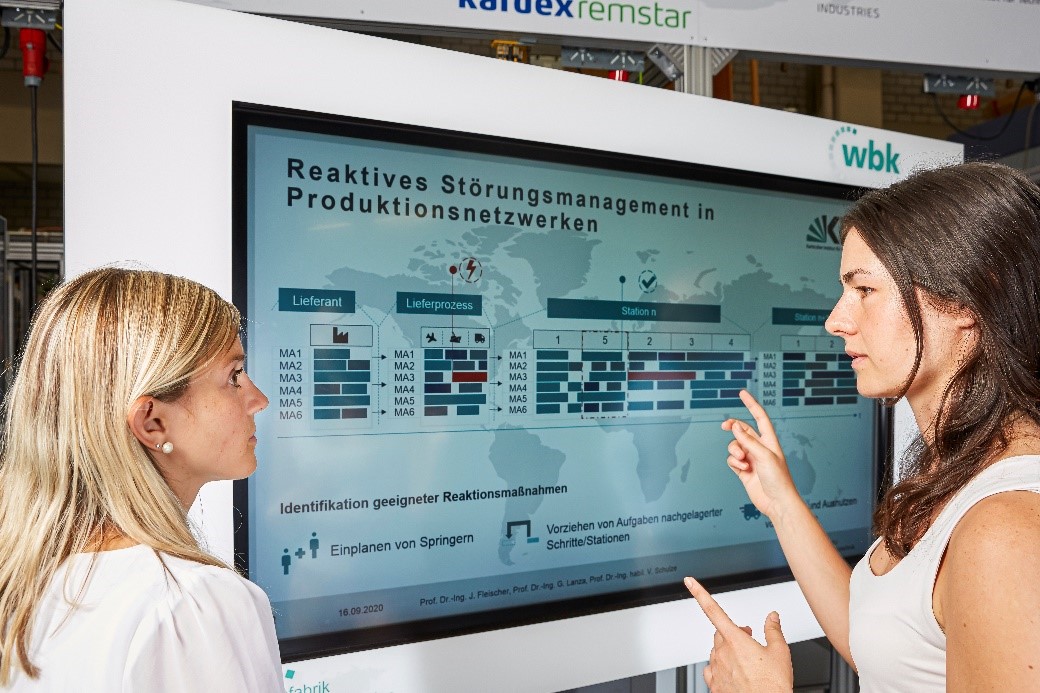Application potential of AI
Relevance
Advancing digitalization in companies is increasingly generating product, customer and process data. These large volumes of data are the basis for implementing a wide range of AI use cases. However, companies often face the challenge of identifying suitable use cases for the application of AI. The hurdles range from the potential of AI applications, which is difficult to assess, to concerns of managers or the workforce about the fundamental use of AI, to a lack of knowledge and support for the successful implementation of AI use cases. As a result, there is a lack of a human-centered process model that can guide companies through the various phases of AI introduction.
Objective
KARL aims to support companies in the identification, selection and introduction of suitable AI use cases.
As part of the identification and selection of suitable AI use cases, a selection methodology is to be developed that presents companies interested in AI with suitable AI applications for their individual problems. Based on a few questions (e.g. planned area of application of AI, desired benefits of AI, existing database), the companies are to receive already implemented AI use cases as food for thought in the form of fact sheets. The fact sheets also provide a description of the AI use cases, information on the potentials and risks, a benefit assessment and organizational framework conditions for implementation. KARL will continuously expand the underlying collection of AI profiles.
To help with the successful introduction of AI use cases, a process model is to be developed that identifies for each group of employees, customers, external partners and other stakeholders the point in time at which these groups should ideally be involved in the implementation of AI use cases. Employees and their attitude towards working with AI are a decisive factor in the successful introduction and use of AI in companies. For this reason, the process model is to be expanded to include an acceptance model. In addition to relevant acceptance factors such as participation, information and transparency, this acceptance model should also include specific methods and measures that can be used depending on the situation during the AI introduction process. Furthermore, the process model and the acceptance model should also contain recommendations for action that indicate the appropriate time to involve social partners (e.g. works councils, data protection officers).
However, a successful introduction of AI depends not only on the employees but also on a number of other factors and their characteristics within the company. KARL would therefore like to offer companies an opportunity to assess their own level of AI maturity with regard to the dimensions of technology, organization, IT expertise and culture. An AI readiness check is therefore to be developed in order to uncover the necessary development potential in companies and thus better implement the selected AI use cases.
Handouts for companies
- Workshop to develop an AI implementation strategy
- Comprehensive collection of AI use cases (domains: mobility, knowledge-intensive services and ICT systems, manufacturing industry, education)
- Selection system for the company-specific identification of suitable AI use cases
- Holistic process model for the introduction of AI in the company
- AI readiness check to assess the company's overall readiness for the introduction of AI
Application potential of AI
Relevance
Advancing digitalization in companies is increasingly generating product, customer and process data. These large volumes of data are the basis for implementing a wide range of AI use cases. However, companies often face the challenge of identifying suitable use cases for the application of AI. The hurdles range from the potential of AI applications, which is difficult to assess, to concerns of managers or the workforce about the fundamental use of AI, to a lack of knowledge and support for the successful implementation of AI use cases. As a result, there is a lack of a human-centered process model that can guide companies through the various phases of AI introduction.
Objective
KARL aims to support companies in the identification, selection and introduction of suitable AI use cases.
As part of the identification and selection of suitable AI use cases, a selection methodology is to be developed that presents companies interested in AI with suitable AI applications for their individual problems. Based on a few questions (e.g. planned area of application of AI, desired benefits of AI, existing database), the companies are to receive already implemented AI use cases as food for thought in the form of fact sheets. The fact sheets also provide a description of the AI use cases, information on the potentials and risks, a benefit assessment and organizational framework conditions for implementation. KARL will continuously expand the underlying collection of AI profiles.
To help with the successful introduction of AI use cases, a process model is to be developed that identifies for each group of employees, customers, external partners and other stakeholders the point in time at which these groups should ideally be involved in the implementation of AI use cases. Employees and their attitude towards working with AI are a decisive factor in the successful introduction and use of AI in companies. For this reason, the process model is to be expanded to include an acceptance model. In addition to relevant acceptance factors such as participation, information and transparency, this acceptance model should also include specific methods and measures that can be used depending on the situation during the AI introduction process. Furthermore, the process model and the acceptance model should also contain recommendations for action that indicate the appropriate time to involve social partners (e.g. works councils, data protection officers).
However, a successful introduction of AI depends not only on the employees but also on a number of other factors and their characteristics within the company. KARL would therefore like to offer companies an opportunity to assess their own level of AI maturity with regard to the dimensions of technology, organization, IT expertise and culture. An AI readiness check is therefore to be developed in order to uncover the necessary development potential in companies and thus better implement the selected AI use cases.
Handouts for companies
- Workshop to develop an AI implementation strategy
- Comprehensive collection of AI use cases (domains: mobility, knowledge-intensive services and ICT systems, manufacturing industry, education)
- Selection system for the company-specific identification of suitable AI use cases
- Holistic process model for the introduction of AI in the company
- AI readiness check to assess the company's overall readiness for the introduction of AI

Maurice Engels
wbk Institute for Production Technology
maurice.engels@kit.edu













